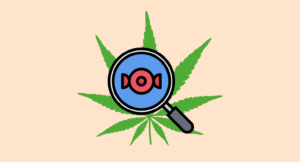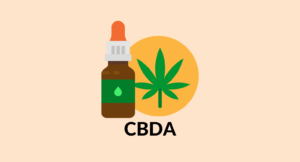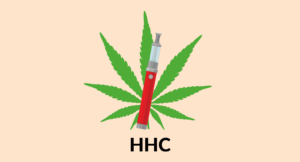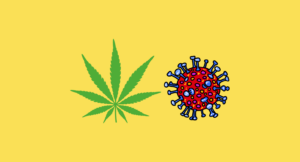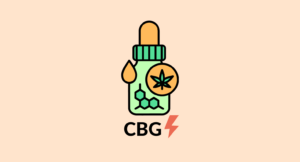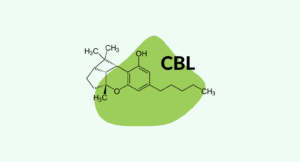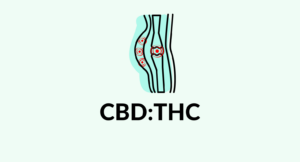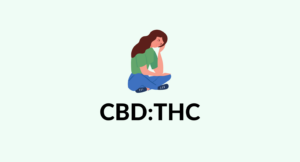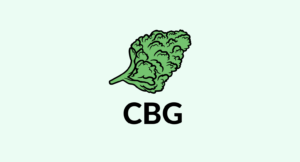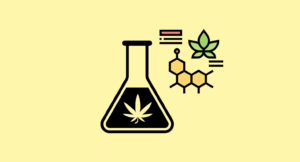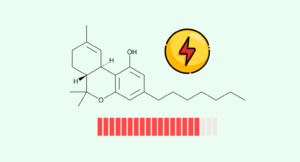Evidence based
What is Delta 10 THC?
Delta 10 THC is brand new to the market.
It’s best described as the more energizing, nootropic form of THC.
Whether we needed it or not, there’s another THC starting to circulate within the cannabis community — it’s called delta 10 THC (Δ10-tetrahydrocannabinol).
You’ve probably already heard of delta 9 THC — the primary psychoactive ingredient in marijuana. And you may have even heard of delta 8 THC — a newer, more mellow form of THC starting to find its way into the mainstream.
I already know what you’re thinking…
What the heck is it delta 10 THC, what does it do, and where can I find some?
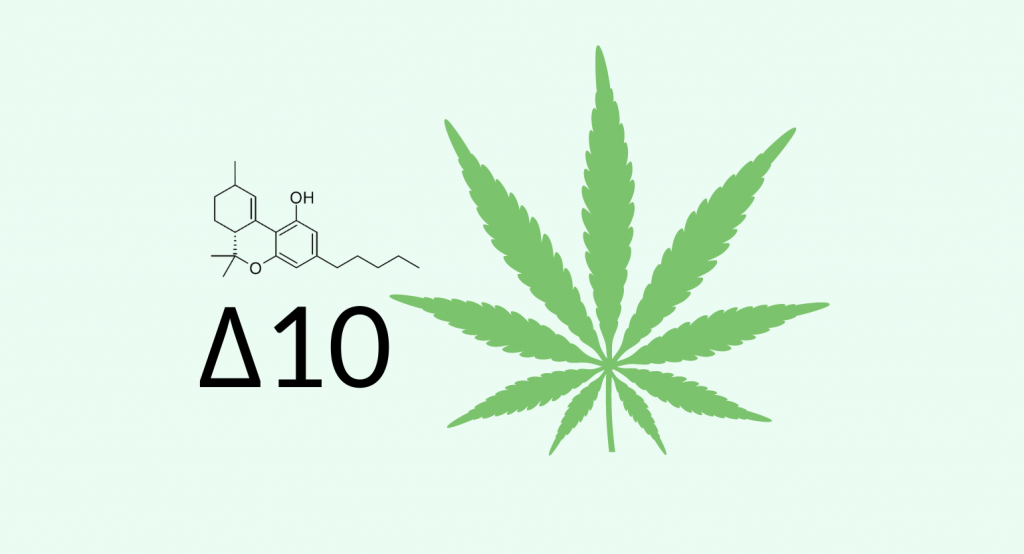
What is Delta 10 THC?
Delta 10 THC is an isomer of delta 8 THC and delta 9 THC.
Isomers are molecules that have the same chemical formula but a different arrangement of atoms.
You can think of it like ice cream. All ice cream is still ice cream, but it comes in many different flavors.
Delta 8, 9, and 10 THC are essentially different flavors of the THC molecule.
There are other versions of THC that are possible as well — including delta 2, delta 3, delta 6, and delta 7 THC — however, most of them are very poorly understood and aren’t available in the mainstream market quite yet.
Delta 9 is the only form that’s produced in any meaningful supply in the natural hemp plant. All other isomers, including delta 10, require chemical intervention to produce.
Delta refers to the position of the double bond in THC’s chemical structure. Delta 10 has the double bond in the tenth position, while delta 9 has this bond in the ninth position — and so on.
This is the only difference between each version of THC. It’s not a big enough difference to fundamentally change the effects you can expect from THC. All forms of THC are psychoactive — however, they do have different potencies and the qualitative experience of the high they produce can be different as well.
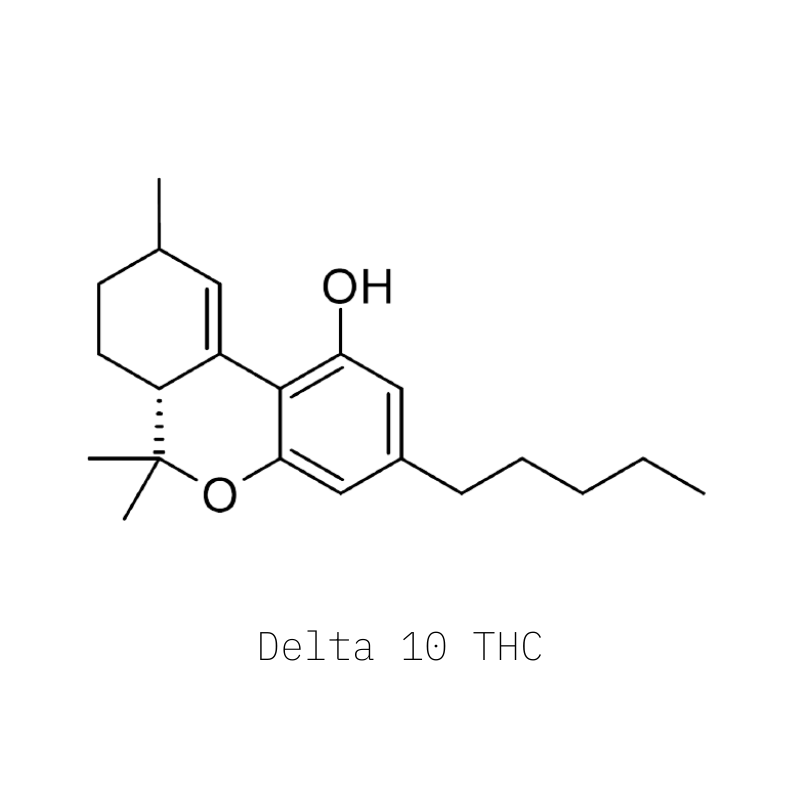
What Does Delta 10 Feel Like?
Delta 10 THC is a new molecule, so very little is known about its effects. There has yet to be any formal clinical studies exploring the effects (and safety) of this cannabinoid.
However, there are a lot of anecdotal reports from people who have tried it (including our own experience).
Here are some of the characteristics noted for this particular cannabinoid so far:
- Δ10 is roughly half as potent as Δ9 THC
- Δ10 is more stimulating & nootropic
- Δ10 is better than Δ9 for promoting flow states, creativity, euphoria, & focus
- Δ10 appears to have less side effects than Δ9
These effects are likely going to make delta 10 THC a staple in the cannabis industry over the next couple of years.
If we could place delta 8, 9, and 10 on a scale, we’d have delta 8 on the far left (sedative and relaxing) and delta 10 on the far right (stimulating and nootropic). Delta 9 would be somewhere in between the two.
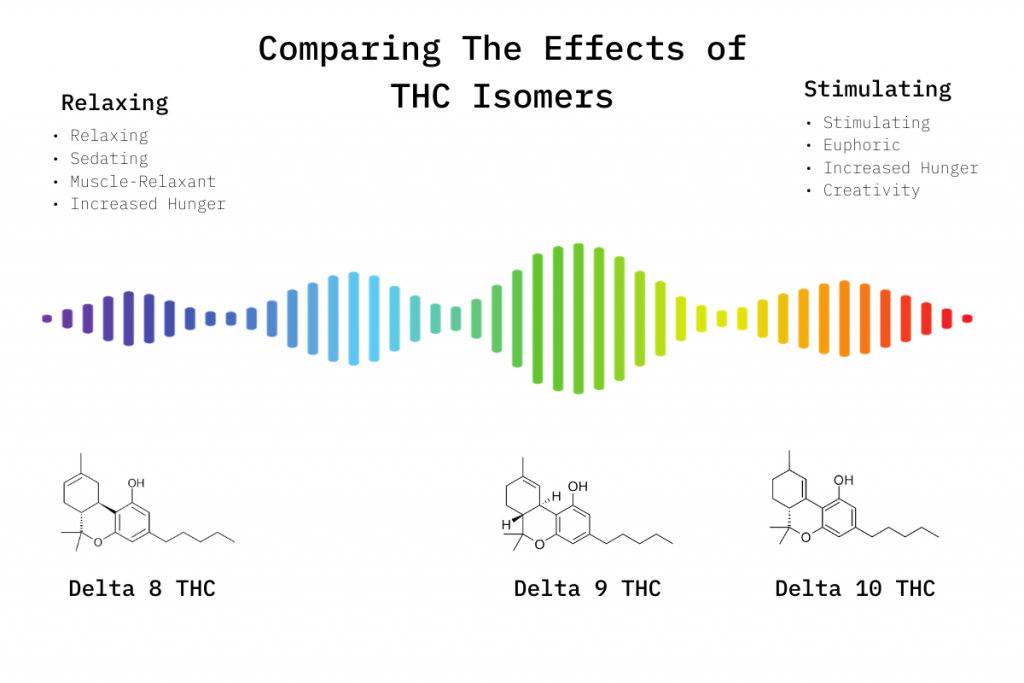
There are many other THC analogs on the market today too, which range substantially in terms of potency:
- THCC — non-psychoactive
- THCV — about half as potent as delta 10 THC
- Delta 8 THC — roughly equivalent potency to delta 10 THC but with more relaxing effects
- HHC — about 30% stronger than delta 10 THC
- Delta 9 THC — nearly twice as strong as delta 10 THC
- THC-O-Acetate — roughly 6 times as potent as delta 10 THC and much more sedating
- THCP — more than 60 times as potent as delta 10 THC
The History of Delta 10 THC
Delta 10 was first discovered in 1984 by a man named Raphael Mechoulam. He published a paper that outlined the synthesis of this molecule — but the method required the use of harsh and toxic chemicals that basically rendered the final product unusable [1]. This same paper highlighted delta 2, delta 3, and delta 6 THC isomers as well — none of which have been studied in any detail.
It wasn’t until recently that delta 10 THC was re-discovered. A company called Fusion Farms discovered it after they inadvertently ordered a large amount of cannabis biomass contaminated by fire retardants from nearby wildfires in California.
Unaware of the contamination, the team processed the hemp as usual. They used a method of distillation and recrystallization to isolate the cannabinoids. During the process, the team noticed a strange formation of crystal in their extract — like nothing they’ve ever seen before.
After running a test to see what chemical they isolated, the scan identified it as CBC (cannabichromene), but the crystal formations looked nothing like the results they’ve obtained previously while extracting pure CBC. So the team kept digging.
It took several months to identify the substance, but it was eventually identified as delta 10 THC with the help of a technology called nuclear magnetic resonance (NMR). This technology is used to identify the chemical structure of unknown molecules.
It turns out it was the exposure to the fire retardant that led to the conversion of delta 9 to delta 10 THC.
An organic chemist by the name of Josh Josh Jones, Ph.D. (owner of Jonesing Labs LLC), set out to find a safer and more reliable method of converting delta 9 THC into the delta 10 isomer using catalysts and a food-grade radical initiator. This was a very innovative idea in cannabinoid science.
After a lot of trial and error, Josh eventually polished a method that produced a yield of about 70–80% delta 10 THC. There’s currently a patent pending on the process, filed in combination by Fusion Farms and Jonesing Labs.
How Much Delta 10 THC Do I Take?
The optimal dose of delta 10 THC is still undetermined. We know it’s not as potent as delta 9 THC — but we still don’t have a clear understanding of how far off it is. Most people who have tried delta 10 report it to be roughly similar to that of delta 8 — which is about half as strong as an equivalent dose of the delta 9 isomer.
Using this metric, we estimate the working dosage range of delta 10 THC is somewhere between 20 mg and 60 mg.
As with any cannabinoid, the dose is likely to fluctuate depending on the individual’s size and weight, experience level (tolerance), and individual metabolic factors.
Whenever trying a new compound for the first time, it’s wise to start with a very low dose — around 5 mg — and wait an hour to see how your body responds. From there, you can increase the dose every hour by 5 mg until you hit what’s called a threshold dose — this is the dose that produces a noticeable change in cognition.
You can continue to play around with the dose by making subtle changes to see what works best for you.
Have you tried delta 10 THC? Fill out our 4 question delta 10 experience survey to help us quantify the optimal dose of delta 10 THC and help us build a better understanding of how it compares to the other isomers.
Delta What Now? Comparing Delta 8, 9, & 10 THC
| Metrics | Delta 8 THC | Delta 9 THC | Delta 10 THC |
| Psychoactivity | Mild-Moderate | Moderate-High | Mild-Moderate |
| Main Effect Profile | Sedative & Relaxant | Euphoric & Stimulant | Euphoric & Nootropic |
| Cost | $$$ | $ | $$$ |
| Concentration in Hemp | Less than 1% | Up to 30% | Less than 1% |
| Receptors | CB1 & CB2 | CB1 & CB2 | CB1 & CB2 |
| Typical Dose | 20–60 mg | 10–30 mg | 20–60 mg |
| Effects on Appetite | Strong Stimulant | Moderate Stimulant | Unknown |
| Anxiety Side-Effects | Very Mild | Mild to Moderate | Very Mild |
| Legality | Legal-Grey Area | Illegal (Except for select states) | Legal-Grey Area |
Is Delta 10 THC Legal?
The legality of delta 10 THC is debatable. Technically, it’s legal under the 2018 Farm Bill as long as it’s made from hemp versus marijuana. Hemp is defined as any Cannabis sativa plant that produces 0.3% THC or less. Marijuana is anything that makes more than 0.3% THC.
The problem is that delta 10 THC isn’t produced in any meaningful supply in hemp. In fact, even marijuana doesn’t produce any meaningful concentrations of the delta 10 isomer.
To make delta 10 THC extracts, labs first need to convert CBD that’s been legally extracted from hemp and convert it into delta 10. There are ways of converting CBD directly to delta 10, but they’re inefficient. It’s easier to convert CBD to delta 8 or delta 9, and then convert this into delta 10 using the method outlined by Josh in his patent.
The DEA (Drug Enforcement Administration) recently stated that any synthetically-derived THC is considered a Schedule I substance on a federal level. Whether delta 10 is considered “synthetically-derived” is up for debate. It’s more likely that delta 10 is considered “naturally-derived” because it’s a compound found in nature, even though commercial products are made in a lab.
This issue is fairly complex and it remains unclear how the federal government views these different isomers of THC. We’ve covered this topic in more detail in our delta 8 THC legal guide.
Several states have specific laws that ban all forms of THC — including delta 10.
There are currently 15 states that have passed their own recreational cannabis laws. These states permit the sale of marijuana derivatives and allow the sale of THC extracts of various kinds.
There are 4 exceptions here that have specifically banned synthetic isomers of THC; this includes Alaska, Arizona, Colorado, and Montana.
Legal marijuana states:
AlaskaArizona- California
Colorado- Illinois
- Maine
- Massachusetts
- Michigan
Montana- Nevada
- New Jersey
- Oregon
- South Dakota
- Vermont
- Washington
Will Delta 10 THC Show Up On A Drug Test?
Most drug tests are limited in what they can detect. They’re designed to detect specific substances that are deemed illegal or otherwise problematic (such as performance enhancement substances in professional athletic associations).
Virtually all drug tests look for THC. These tests aren’t sophisticated enough to differentiate between delta 9 THC and other forms of THC — which means if you’ve consumed delta 10 THC, you’re most likely going to register a positive for THC and fail the test.
If you’re regularly subjected to drug testing, we recommend you avoid using delta 10 THC unless you have a specific medical exception or live in a legal state (except for the four states mentioned above).
If you’ve been using delta 10 THC and have a drug test scheduled, it’s important to stop using the substance immediately and begin a detox program. Ideally, you should stop using any form of THC at least a month before the test to ensure it’s completely eliminated from the body.
Note: There are some (unconfirmed) reports that another THC analog, called HHC, is able to avoid detection on standard drug tests because it isn’t converted to 11-hydroxy-THC — which is what most drug tests look for.
How to Use Delta 10 THC
Delta 10 THC isn’t widely available, but we expect to see it available in the same forms you’ll find CBD and other THC products. This includes distillates, tinctures, capsules, gummies, vapes, and more.
We may even see delta 10 rich hemp flowers in the future. These products are made by spraying hemp flowers with delta 10 extract.
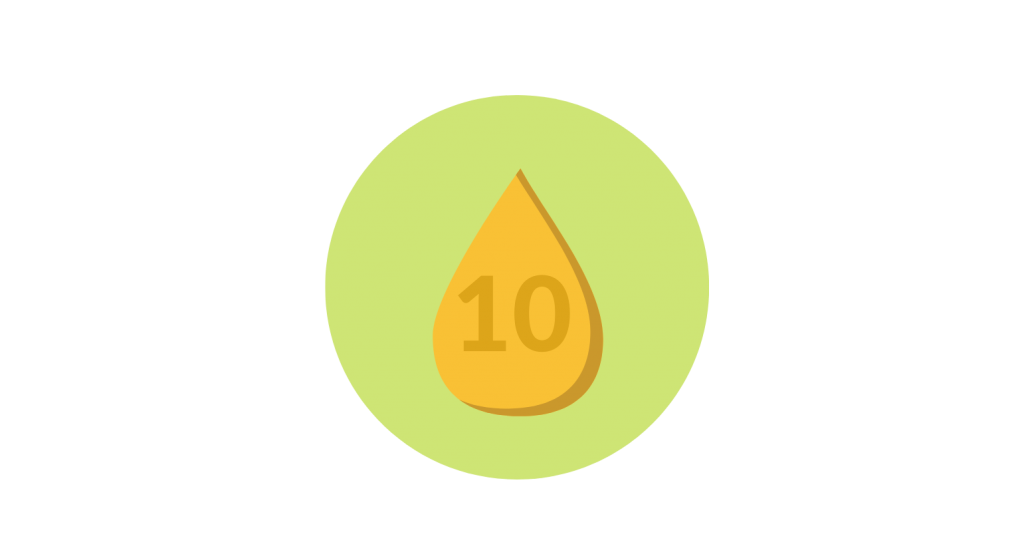
Delta 10 THC Distillate
Distillates are the first product type we’ll likely find on the market. This is because all other delta 10 products are made from distillate as a starting point.
Using distillates is fairly straightforward, but be cautious when trying it for the first time. This form of cannabis extract is very potent — so it’s easy to use too much.
You can use distillates by smoking it from a dab rig, adding it to an electric vaporizer, eating it directly, or using it to make your own delta 10 tinctures of gummies.
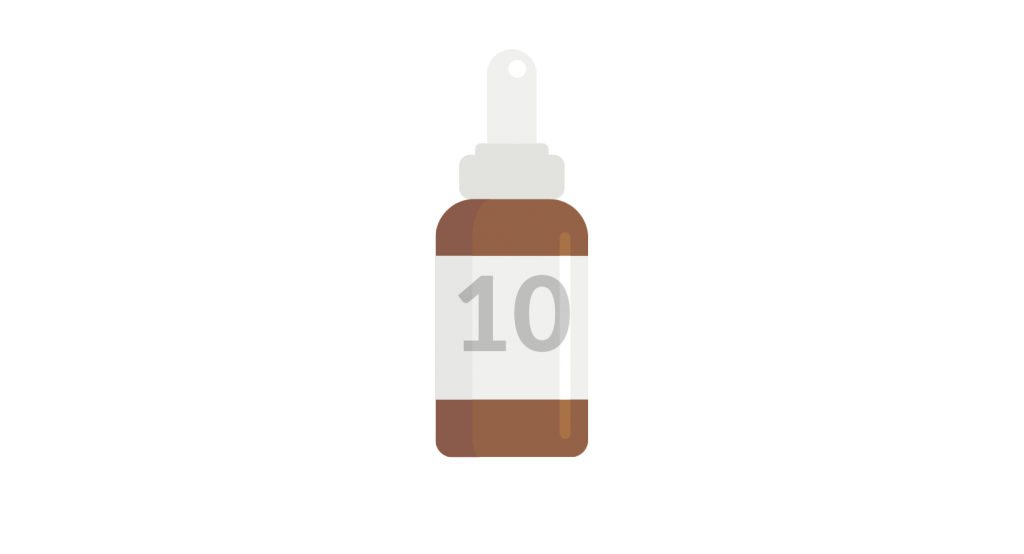
Delta 10 THC Tinctures
Delta 10 distillates can be infused into an oil base to make it easier to use. It also makes it safer by diluting it from the highly concentrated form.
We haven’t seen any delta 10 THC tinctures yet, but they’re coming soon. It’s only a matter of time before people start hearing about this innovative new product type and companies start creating their own tinctures to meet the demand.
A tincture can be used in one of two ways — direct ingestion, or sublingual administration. Both are very similar.
“Sublingual” refers to substances that are absorbed through the capillaries under the tongue. Here, a network of blood vessels lies directly under the surface of the mouth.
Substances like THC can cross from the mouth, directly into the bloodstream through this network — effectively bypassing first-pass liver metabolism and exerting their effects within a few minutes. To use this method, simply hold the tincture under your tongue for a minute or two before swallowing.
The other option is to simply swallow the tincture straight away, or adding it to other edible products like smoothies or shakes. The onset of effects will take longer but should offer the same level of potency.
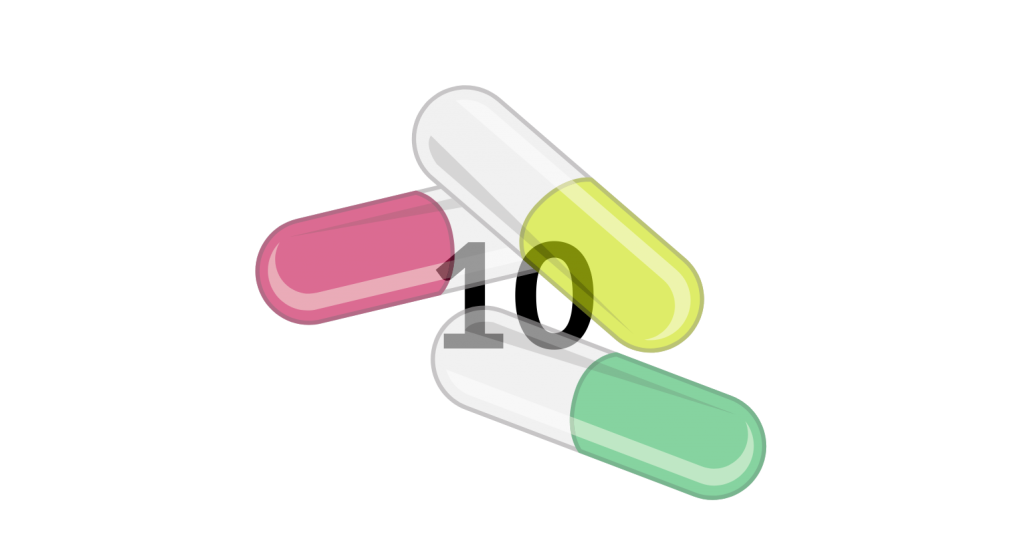
Delta 10 THC Capsules
Capsules are another easy method for using cannabis products. They’re made by filling gel capsules either with the distillate directly or with a prepared tincture or oil.
Delta 10 THC capsules offer the advantage of providing a precise and consistent dose. Say you buy a 20 mg delta 10 THC capsule. Every time you take the capsule, you’re going to get the exact same dose and the exact same intensity of effects.
Capsules are great for people who take THC daily and don’t want to mess around measuring oils, smoking a dab rig, or vaping. They’re simple, discrete, and cost-effective.

Delta 10 THC Gummies
Gummies are just like capsules, but instead of a tasteless capsule, the delta 10 THC content is infused into a fruity gummy candy. They serve the same purpose as a capsule by delivering a precise dose of delta 10 THC in each piece.
Be cautious when using gummies because it can be easy to take too much. They’re delicious, and most people have the impulse to go in for more. Remember that there is such a thing as too much delta 10 THC, so take note of the dose, and cut yourself off once you’ve reached it.
Related: Ranking The Top 12 THC Gummies By Category (Δ8, Δ9, Δ10 & More).
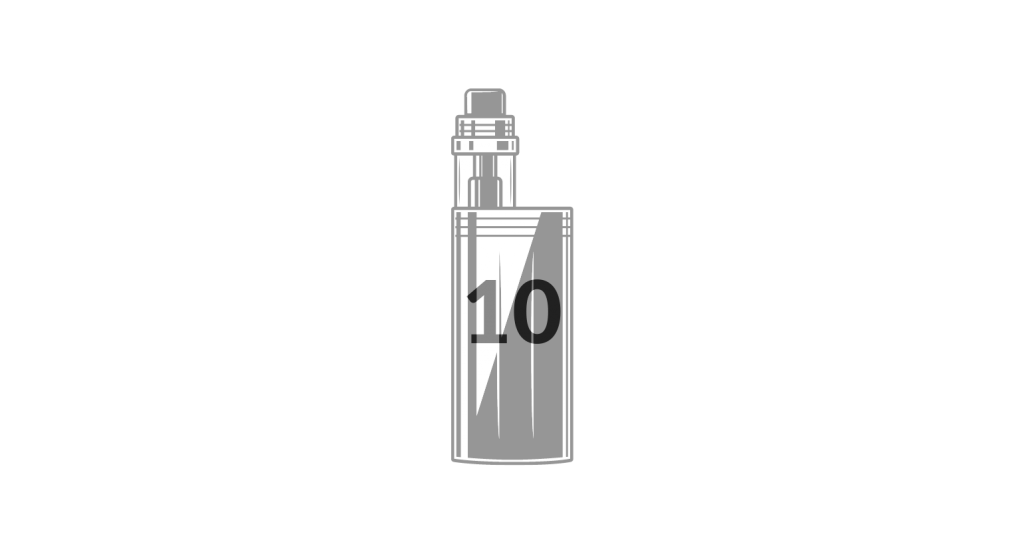
Delta 10 THC Vapes & Cartridges
The fastest way to feel the effects of any cannabis products, including delta 10 THC, is through inhalation. This can be done by smoking the distillate in a dab rig, but this is damaging to the lungs. Most people prefer to use a vaporizer instead — which heats the extract to its evaporation point but keeps it below the point of combustion.
There’s a big difference between evaporation and combustion. The chemical process taking place with combustion produces a variety of toxic compounds, including radioactive isotopes, carbon monoxide, and other dangerous hydrocarbons.
When we vaporize something, none of this conversion takes place. The particles we inhale are more like vapor than smoke.
Vapes might use delta 10 THC distillate alone — others may mix in e-liquid ingredients such as vegetable glycerine or propylene glycol to create a thick white vapor.
Watch out for vapes that use MCT oil or vitamin E — these ingredients are not safe and should be avoided in vaporizer format at all costs.
Also, watch out for vapes from brands you don’t recognize or that are very cheap. If it’s too good to be true, it probably is. There are a lot of scams in this space, as well as companies selling unethical or unsafe products. Some vapes, for example, have been found to contain unsafe levels of lead or other heavy metals.
Is There Any Research on the Health Benefits of Delta 10 THC?
Delta 10 THC has not yet been studied — in any context. The only report on this substance comes from a 1984 paper in which a chemist by the name of Raphael Mechoulam first identified the substance and outlined his process for synthesizing it from delta 9 THC.
To date, there are no animal or human studies exploring the effects of delta 10.
With that said, based on our experience and other early reports of people who have tried delta 10, it’s very likely this substance offers more or less the same benefits as both delta 8 and delta 9 THC — for which there’s a lot more data. Delta 10 THC produces the same high but is more likely to produce stimulating, euphoric, and creativity-inspiring effects.
This could mean delta 10 THC is going to be more useful for conditions like ADHD, fatigue, fibromyalgia, multiple sclerosis, depression, or neurodegenerative disorders than other forms of THC.
With that said, until more research is available, we can’t make any definitive claims about what delta 10 THC can offer.
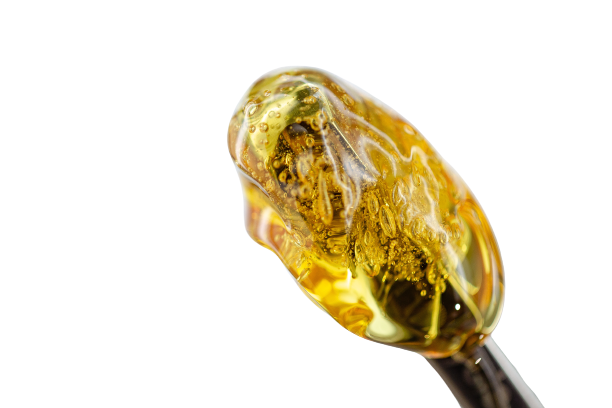
Final Thoughts: What The Future of Delta 10 THC Looks Like
Delta 10 THC is yet another new isomer of the THC molecule. It’s psychoactive, just like its sister molecules, delta 9 and delta 8 THC, but slightly less potent.
In terms of effects, we consider delta 10 the ideal version of THC for daytime use, while delta 8 is more ideal for the evenings. Delta 9 is somewhere in between both isomers.
This cannabinoid lacks any substantial scientific research. While it was discovered back in 1984, along with several other THC isomers, it’s only in the past few months that this cannabinoid has become popular mainstream.
We expect the delta 10 THC industry to explode over the coming years as people seek out new angles of the classic THC experience. The stimulating and creativity-enhancing benefits this cannabinoid offers are in high demand. This is likely going to be the driving force behind this particular isomer among the mainstream public.
References
- Srebnik, M., Lander, N., Breuer, A., & Mechoulam, R. (1984). Base-catalysed double-bond isomerizations of cannabinoids: structural and stereochemical aspects. Journal of the Chemical Society, Perkin Transactions 1, 2881-2886.

